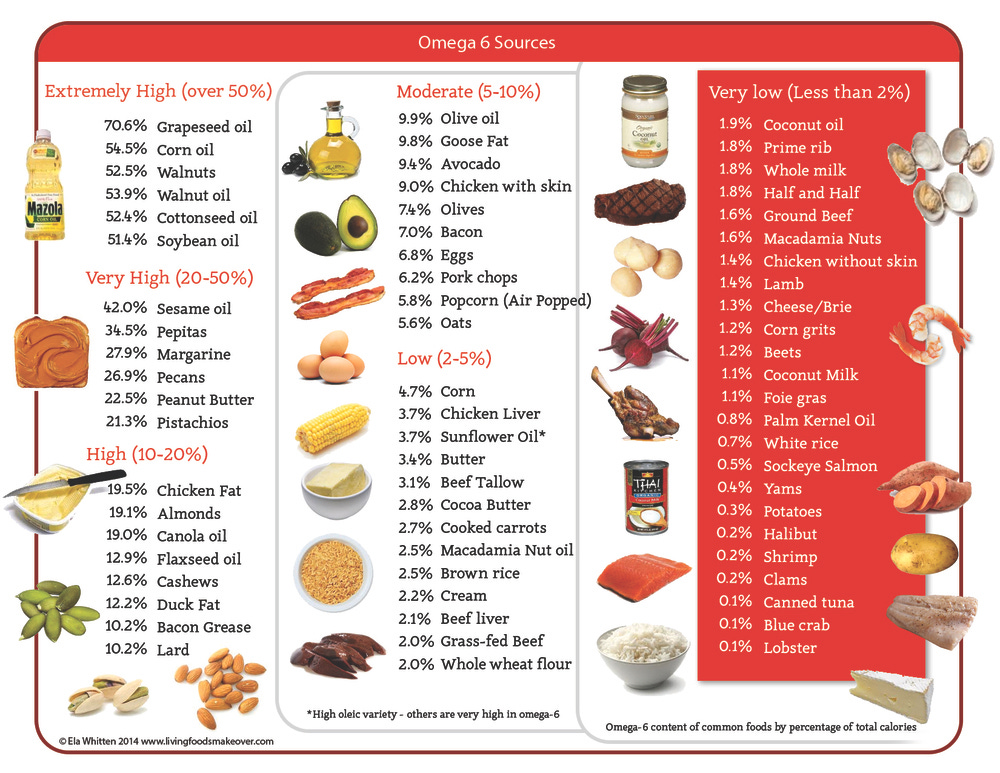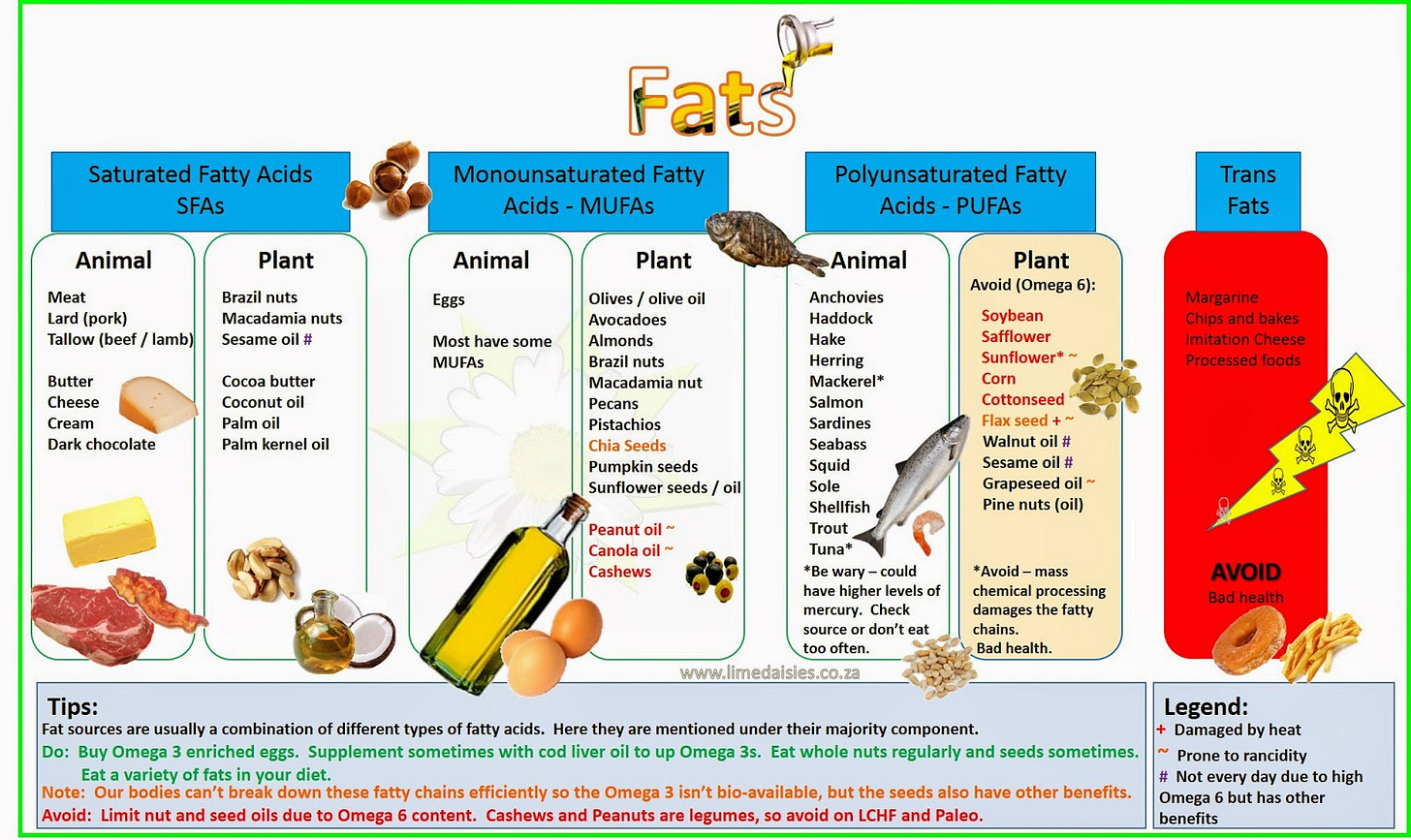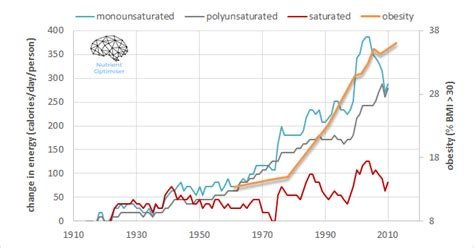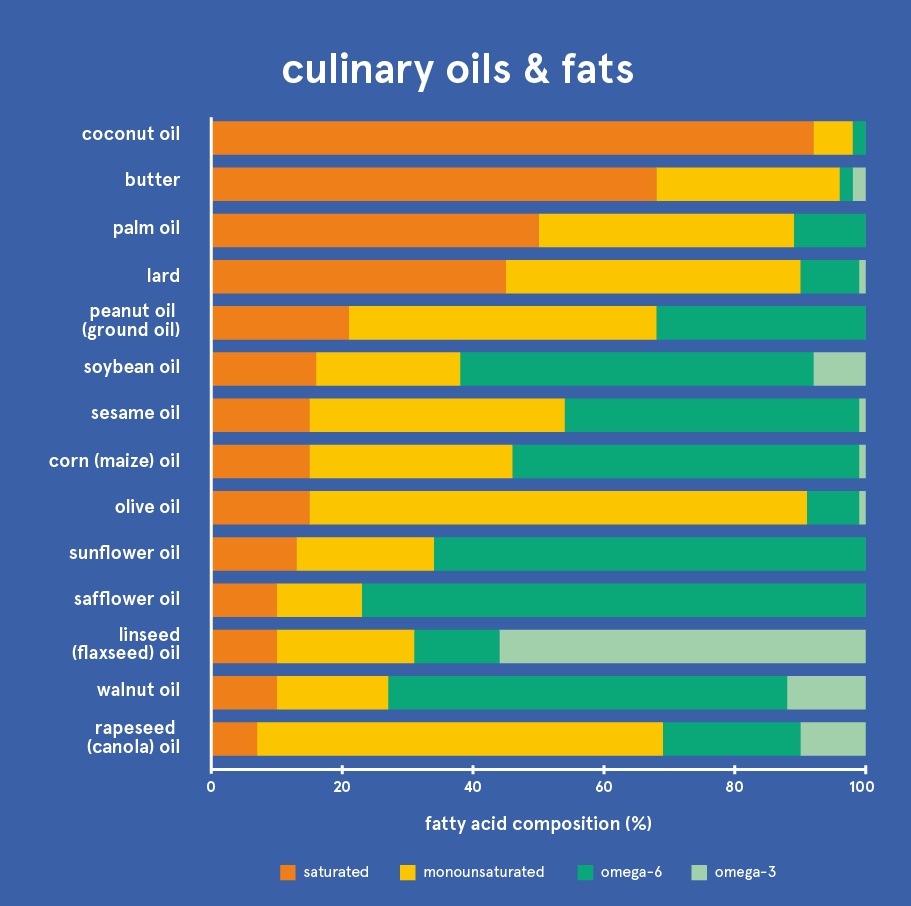Seed Oils Are Destroying Your Health
They're Causing Slow Suicide
Seed oils are known scientifically under many names: linoleic acid, omega-6 fatty acids, and both monounstaturated and polyunsaturated fatty acids (MUFAs & PUFAs).
They typically include soybean, corn, canola (rapeseed), safflower, sunflower, cottonseed, grape seed, and rice bran oils. Commonly called vegetable oils.
Omega 6 Sources
None of these seed oil fats were historically part of the human diet, as our ancestors did not press the oil out of soybeans or corn in the wild, and in fact humans did not eat beans and grains at all until quite recently. Historically, our ancestors were hunter-gatherers who ate mostly meat and fruit – they mostly hunted large game (ruminant animals) and gathered eggs and ripe fruit. The fat sources in the traditional human diet included lots of fat from animals as well as from fruits that contain fat like olives, avocados, and coconuts.
These oils are extracted from seeds using a multi-step process including drying, grinding, steam cooking, solvent extraction, heating to remove solvents, followed by water, acid, caustic soda and bleach added to remove any colors, then filtered to remove the bleaching agents, and finally, steamed to remove the bad odors.
As you can tell, seed oils are far from what some people might consider a food. It's mainly a waste product, washed and cleaned with toxic chemicals.
There are 3 basic types of fat: saturated fat, monounsaturated fat, and polyunsaturated fats. Saturated fat largely comes from animal fats and coconut oil, monounsaturated fats come primarily from fatty fruits like olives and avocados as well as canola seeds, sunflower seeds, almonds and peanuts, and polyunsaturated fats primarily come from soybeans, safflower seeds, sunflower seeds, corn, cottonseed, flax seed, walnuts, sesame seed, grapeseed, asnd pine nuts.
Saturated fat is solid at room temperature (think beef tallow and butter) due to being completely “saturated” with hydrogen. This causes saturated fat to avoid bonding with oxygen, since it does not have any double bonds that can attach to oxygen molecules. This also allows saturated fat molecules to stack together, which is what makes it solid at room temperature.
When mono- and polyunsaturated fats have an area that lacks a bond with hydrogen, the fat molecules can bend there, and no longer are able to stack neatly together like they do with saturated fat. Because of these bends in the fat chains, mono and poly fats are liquid at room temperature.
If a fat is not “saturated” with hydrogen bonds, oxygen atoms can attach to the long fat chains – mono (which means “one”) fats have one oxygen-attracting bend, and poly (which means “many”) fats have multiple bends. When oxygen attaches to these bends, the fat becomes oxidized, which means that the fats are going rancid and causing inflammation and disease in the human body.
Linoleic acid is so unstable that it auto-oxidizes even if it’s just sitting in your cells. If you eat enough of it it will build up in your cells and it will oxidize there. It then turns into HNE, a substance that’s highly reactive and toxic to the cells. Oxidized linoleic acid is indistinguishable to your body from a bacterial infection. This creates an autoimmune condition in the body which stimulates the production of macrophages to deal with the apparent infection. If an individual has a staff infection, that’s about as bad as it gets in the body, and by eating seed oils you are mimicking a staff infection in your body to your immune system. This is the exact same mechanism as occurs with poison ivy, which is also caused by polyunsaturated fatty acids. Nobody eats poison ivy. You would have to be out of your mind to do that, yet we all eat seed oils which have the same metabolic effect on our immune system as poison ivy.
The fats we eat get incorporated into the body’s tissues, and all cells in the body have a phospholipid membrane – meaning that the outside wall of each of our cells is made of various kinds of fat. When the cell membrane is composed of the weaker, more liquid mono- (MUFAs) and poly- fats (PUFAs), the cells become weak and damaged which can lead to metabolic diseases such as diabetes, obesity, heart disease, stroke, and cancer.
Cut out all seed oils if you care about your mitochondria or your gut.
Mitochondria are often referred to as the powerhouses of the cell, and are vital to our survival. Their main function is to generate the energy necessary to power cells, but are also involved in other tasks, such as signaling between cells and cell death, otherwise known as apoptosis.
Seed oils contain massive amounts of omega-6 linoleic acid, a polyunsaturated fat (PUFA) that clearly impairs the membrane of mitochondria, signaling scarcity in the body, causing us to become fat and promoting the progress of metabolic and chronic diseases.
When mitochondria stop functioning, the cell they are in is starved of energy. So, depending on the type of cell, symptoms can vary widely. As a general rule, cells that need the largest amounts of energy, such as heart muscle cells and nerves, are affected the most by faulty mitochondria.
Seed oils are the biggest offender when it comes to chronic disease and metabolic dysfunction.
As the graph above shows, polyunsaturated fats were introduced into the human diet shortly after World War I. It started with Crisco, a company that began to chemically process cottonseed oil to make it available for popular consumption. This fat was advertised to Americans as a “heart healthy” alternative to the tallow, lard, and butter that had been common up until that time. It’s notable that the graph also shows the amount of obesity rising steadily with the increase in monounsaturated and polyunsaturated fat intake.
There is rampant misinformation in the US regarding seed oils, and many in the medical community advise that people consume large amounts of seed oils. This misinformation stems from the idea that consuming PUFA reduces cholesterol, and that high levels of LDL cholesterol is linked to heart disease. This “research” largely benefits the agriculture industry and the medical establishment. It has been proven wrong by a number of studies showing that not only does lowering LDL cholesterol (and cholesterol numbers in general) not protect against heart disease, it actually RAISES the risk.
Some nutrition researchers have reported that PUFAs just need to be in a specific ratio with omega-3 fats, but this is not true. Although omega-3 fats (like fish oil) are also technically polyunsaturated fats with similar multiple bends, they are not as harmful as the omega-6 poly fats from seed oils and may have some benefit in the human body. But, the ratio of omega-3 and omega-6 (another name for seed oil-derived PUFA) is not important. What is important is keeping the total amount of seed oils in your diet down as far as you can, as they are poisonous, get stored in our bodies, and take a very long time to detoxify.
Researchers have found that eating an average Western diet it takes from 4-7 years to remove all stored seed oils from the body. Since research is also showing that seed oils are likely the main cause of not only obesity, but also all the other metabolic diseases like heart disease, diabetes, and cancer, it’s clear that we need to get our seed oil consumption down as low as possible, as fast as possible, and eliminate them completely. They are absolutely not fit for human consumption.
Not only were seed oils introduced as food for humans, but they were also introduced as food for livestock. Animals like chickens and pigs are monogastric, meaning that they have one stomach - and all monogastric animals store the seed oils they eat without converting them into another kind of fat, like healthy saturated fat. If monogastric animals are fed seed oils, they store the seed oils, and then when we eat the bacon or chicken skin, we are eating the stored seed oils in their fat.
Cows are the best fat source because they are polygastric (they have four stomachs) and ample beneficial bacteria in their stomachs to help convert the fats they eat – even when the cows are fed corn and corn oil – into healthy saturated fat. So even corn-fed beef still makes healthy saturated-fat rich butter and tallow, and this means that the fat from ruminant animals (bison, goat, elk, lamb, and sheep, as well as cows) is always going to be the safest and healthiest fat for the human body.
So how do we avoid seed oils? It’s not as challenging at home, as we can just swap out any “vegetable” oils that we have (which are all seed and nut oils) for healthy beef tallow, butter, and high-quality 100% olive oil, and coconut oil, in addition to avoiding the fat from chicken and pork – while still enjoying the protein from these animals like boneless skinless chicken breasts, fat free ham, and lean pork loin (which are easy to buy at any grocery store). We also need to avoid eating all beans, nuts, and seeds, as their main source of fat is from seed oils.
The real problem is eating at restaurants. Studies have found that up to 40% of the calories in a typical restaurant meal are from seed oils, as they are very cheap and help keep costs down. Basically, most restaurant food is completely saturated in seed oils. All fried food, sauteed food, salad dressings, and sauces derive their calories from seed oils. French fries. Ranch dressing. Asian stir-fry. Sauteed onions. Chicken fingers. Chicken wings. All seed oil.
The two things that you can always order in a restaurant and be fairly confident that they are free of seed oils are beef burgers (no bun or mayo) and steak. Since beef has a good amount of fat in it, cooks and chefs don’t usually add any oil to the pan or griddle when cooking burgers and steaks. If you want to order a salad on the side, ask for oil and vinegar and dress it yourself. If you want to order a baked potato, ask the server to check that they have 100% butter or have them bring you the butter packets so you can read the ingredients. Even some popular chain steakhouses serve “butter” that is a 50% seed oil blend.
Most restaurants in the US use canola oil in their fryers, so eating deep-fried foods should always be avoided unless they can verify they’re using animal fats or coconut oil. Traditionally French food (and Italian food too) abhors seed oils and only uses animal fats. This is the reason for the so-called “French paradox” - the observation that despite eating lots of carbs and high-fat food, French people do not historically get fat or have many of the Western diseases like diabetes and heart disease.
There are a number of beneficial healing effects in the body from removing seed oils from your diet and making sure that you don’t get more than 10 grams per day from all sources, including beef and eggs. Within a few months of removing seed oil people often report that they can eat moderate amounts of carbohydrates again without gaining weight, and intense cravings that they would get from having a serving of carbohydrates will no longer occur.
Another major benefit is the fact that many people who stop consuming seed oils also stop burning in the sun! The reason that we get such high levels of sunburn and skin cancer is likely because the high level of seed oils in our diet is weakening our skin cells and causing our skin to become damaged from sunlight. Of course our ancestors got a lot of sun - for hundreds of thousands of years humans were hunter-gatherers living near the equator. Why would we suddenly be experiencing so much sunburn and skin cancer? It’s not the sun, it’s the oils (as well as the toxic sunscreens) damaging our skin!
So what else should we eat? The most important change we can make is to remove seeds, nuts and their oils from our diet.
All foods derived from seeds are damaging to the human body - including nuts, grains and beans. Even the seeds in fruit and berries can sometimes aggravate those with a more damaged gut lining. Not only do seeds like grains, beans, and nuts contain seed oils, but they also have many other plant toxins in them to deter animals from eating them. Plants can’t run away like animals, so plants put defense chemicals in the parts of the plant that they don’t want you to eat - mostly the seeds, stems, and leaves.
When humans grind the seeds into flour or chew them, we are releasing these toxic plant chemicals into our bodies and damaging our intestinal lining and all of our cells. A common seed defense chemical is gluten, which is the protein found in the bran (outer) part of the seed of wheat plants and wreaks havoc on the gut and digestive system of humans. Grains were only added to the human diet in the last couple of thousand years with the advent of agriculture.
Although olive oil and avocado oil are low in Omega-6 monounsaturated fats and contain a very low amount of PUFA as Omega 3, there are a couple of other concerns with consuming these forms of fat. They do still have one bend, so they are able to oxidize, and need to be cold pressed (so-called “extra virgin”), and stored in dark containers. As they are liquid at room temperature, they are not as healthy for the body’s cells as saturated fats which have no bends and cannot oxidize at all. Saturated fats are firmer fats that are stronger for our cell linings. The second problem with olive oil and avocado oil is the fact that many American companies have recently been caught lying on the label and adulterating these fats with seed oils. One recent study found that over 80% of avocado oils and olives oils have been cut with seed oils*. Luckily, studies have found that Costco’s Kirkland Brand is 100% pure olive oil! Also the Chosen Foods brand of avocado oil at Costco is 100% pure. The only other brand that the study found that contained 100% avocado oil was Marianne’s, which is sold at Costco and Whole Foods.
There is rampant fraud in the food industry in the US. Not only are companies adulterating oils, but the food industry and the US government are allowing misinformation to negatively affect the health of Americans, switching out our fryer oils from healthy tallow and coconut oil to extremely unhealthy seed oils in the 1980s, and driving up levels of obesity and disease in the decades since. It is up to us to change our diets and heal our bodies. The good news is that it’s possible, many of us have already done it. Throw out your seed oils, stop eating chicken and pork fat, refuse to eat foods at restaurants that contain seed oils, call your local restaurants and grocers and request healthier fats, and bring your own olive oil and butter with you when you go out to eat or go to a friend’s house for dinner.
Even if you cheat and eat junk food, DO NOT EAT SEED OILS!







Q: (seriously) Interesting article. Thanks. Have you looked into milk (and maybe butter, or is that different) associated with prostatic cancer? Is consuming milk different from consuming butter, as butter is made of milk? Thanks a lot
Nicely done, I just recently tried explaining this to someone and they kept trying to dismiss it with one thing after another.